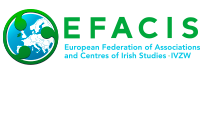- Centre of Irish Studies
Contact and Head of Centre:
Prof. Dr. Katharina Rennhak
Wuppertal, Germany
Email: rennhak@uni-wuppertal.de
At the University of Wuppertal the tradition of Irish Studies reached one of its first climaxes when Heinz Kosok hosted the first IASIL (then: IASAIL) conference in Germany in 1981 and served as the president of IASIL from 1982-1985. Professor Kosok encouraged and supervised the work of a then new generation of German scholars dedicating themselves to Irish Studies. Together with Rüdiger Imhof he built up an extensive Irish Studies library at the University of Wuppertal. Both, Heinz Kosok and Rüdiger Imhof published influential books, among them a seminal study on Sean O’Casey and a history of Anglo-Irish Literature (by Heinz Kosok) and the first monograph on John Banville’s work (by Rüdiger Imhof).
One of their legacies is the Walter Macken Archive, which was purchased in 1977 and comprises an extensive number of typescripts of Macken's published and unpublished works and a plethora of other Macken-related sources.
With Katharina Rennhak's appointment as professor of English Literary Studies in 2009, the university chose a keen supporter of Irish Studies who seeks to continue the tradition. With the lecture series "Narrating Ireland" in 2011, she re-established Wuppertal on the map of European Irish Studies. In 2015, the Walter Macken Centenary Symposium, which brought together some of the foremost international experts in Irish Fiction, Theatre and Film Studies succeeded in awakening an academic interest in the best-selling Galway author and famous actor.
Members
Anna Hanrahan
Prof. Dr. Sandra Heinen
Eva Kerski
Pia Martin-Bodynek
Prof. Dr. Katharina Rennhak
Research interests
Most of our research projects are closely affiliated with the Wuppertal Center for Narrative Research and are driven by an interest in the correlation of the politics and aesthetics of non-literary and (more often) literary texts.
Issues at the intersection of Irish Studies, Narrative Theory and Gender Studies
Irish fiction around 1800
Contemporary Irish fiction and drama
Walter Macken
Historical novels
Current PhD Projects
- Becker, Daniel. On the Threshold of Memory: National History and Liminal Remembrance in Contemporary Irish Poetry (successful disputation: 25 Jan. 2019)
- Hanrahan, Anna. Narrating Irish Identity in Celtic Tiger Drama
- Kerski, Eva. The Representation of Family Concepts in Post-Conflict Irish Drama
- Preuss, Lukas. Dislocated Irishness: Nation, Race, and Irish-American Identity in Contemporary Fiction and Culture
Courses taught
As part of our BA, MA and MEd programmes we regularly offer lecture series and seminars on Irish Literature and Culture around 1800 as well as on 20th and 21st-Century Irish Culture, Fiction, Film and Drama.
 Efacis
Efacis 


